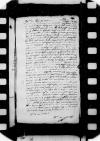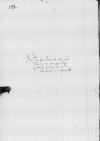Letter #2063
Ioannes DANTISCUS to Tiedemann GIESEWartenburg (Barczewo), 1539-01-28
English register:
Having perused the letters from the Voivode of Pomerania [Jerzy Konopacki (Georg von Konopat)] to the Voivode of Marienburg (Malbork) [Georg von Baysen (Jerzy Bażyński)] and to the Gdańsk (Danzig) Town Council, Dantiscus has concluded that Konopacki has revealed to “Bone” (Os) [Stanisław Kostka] what was said at meetings to discuss storing the money [from taxes]. Thanks to this, the man obtained a document from the court to collect the gathered sum. In Dantiscus’ view, Konopacki acted the way he did because in exchange he expected the royal court’s favour in his conflict with the Kos family over a mill. In his letter to von Baysen, Konopacki claims he knew nothing about the matter because the town scribes had not announced a discontinuance [of the Graudenz (Grudziądz) Diet of Royal Prussia], while in his letter to the Gdańsk Town Council he admits that he had known of the matter but had no knowledge of the King’s [Sigismund I Jagiellon’s] reply, which is not true. Dantiscus thinks that unless the towns offer resistance, the state [i.e. Royal Prussia] will be on the brink of ruin.
Dantiscus supports the idea of writing to the King. He suggests that the letter’s message should not be a suggestion that the money be kept until the next [Royal Prussian] Diet, but a request that a final settlement of accounts take place during that assembly.
In claiming that the tax money should be transferred to the King, Konopacki ignores the fact that the tax was enacted to serve the needs of the Prussian lands and for their defence. This is reasoning typical of people who are not indigenous.
Dantiscus asks Giese to keep the matters discussed here secret. In his view, Konopacki’s seal [under the letter to the King] is not indispensable – the acceptance of Giese, the Voivode of Marienburg, the Castellans of Elbing (Elbląg) [Ludwig von Mortangen (Mortęski)] and Gdańsk [Achatius von Zehmen (Cema)], and possibly the Voivode of Kulm (Chełmno) [Johann von Lusian (Luzjański)] will be enough. He himself, as he wrote earlier, will get involved at the appropriate time.
Manuscript sources:
Prints:
| ||||||||||
Text & apparatus & commentary Plain text Text & commentary Text & apparatus
Reverendissimo in Christo Patri et Domino, domino
Reverendissime in Christo Pater et Domine, frater et amice carissime et honorande.
Salutem et fraterni amoris commendationem.
Perlectis litteris domini
Utcumque res habet, scribendum tamen esset
Haec omnia in ea, quae inter nos crevit, fiducia apud Dominationem Vestram Reverendissimam maneant. Quodsi
Quam dominus Deus sospitet prosperetque in omnibus diutissime.
Ex
Reverendissimae Dominationis Vestrae deditissimus frater
[1 ] This letter, which is unknown to the editors, was attached to cf.
[2 ] Negotium molendini, “the mill case”, was being discussed during the spring meeting of the
[3 ]

